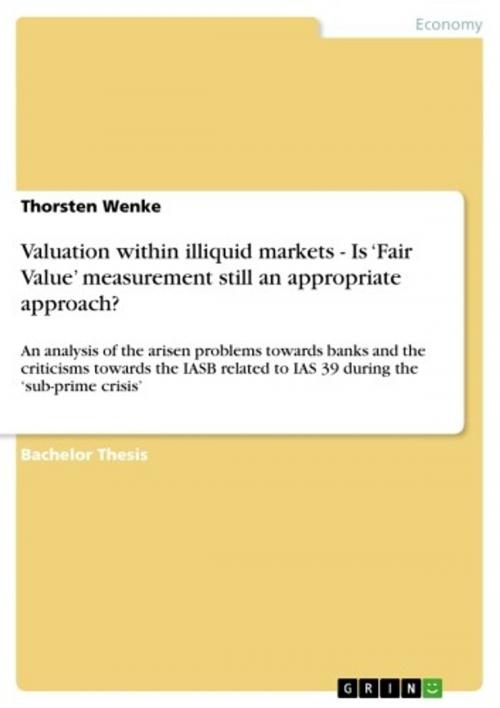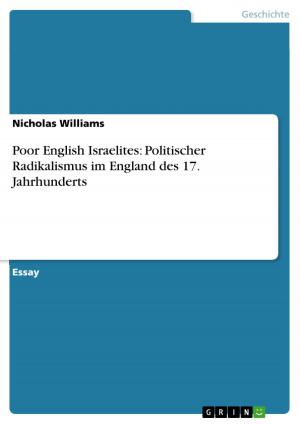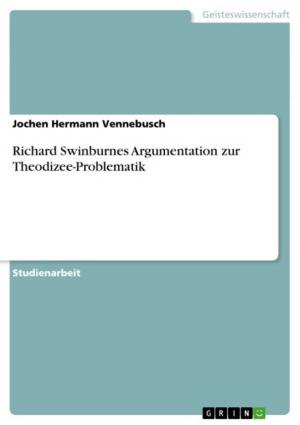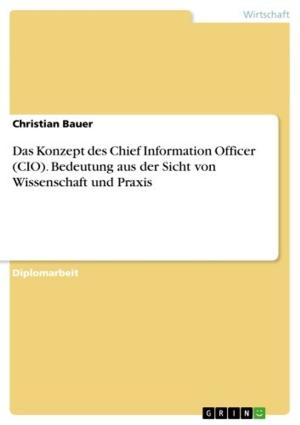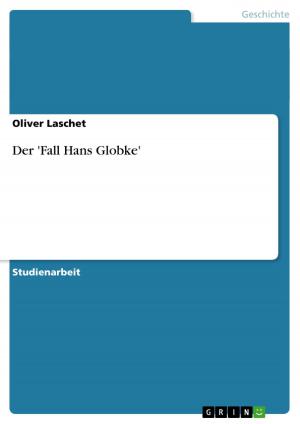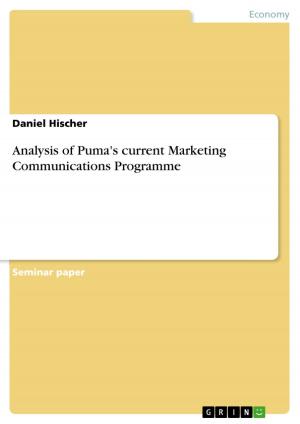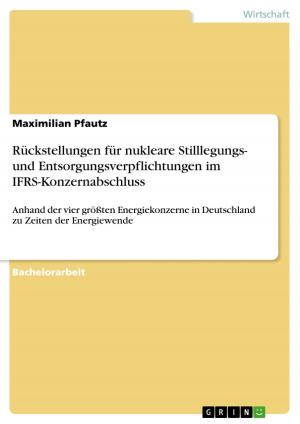Valuation within illiquid markets - Is 'Fair Value' measurement still an appropriate approach?
An analysis of the arisen problems towards banks and the criticisms towards the IASB related to IAS 39 during the 'sub-prime crisis'
Business & Finance, Finance & Investing, Banks & Banking| Author: | Thorsten Wenke | ISBN: | 9783640442546 |
| Publisher: | GRIN Verlag | Publication: | October 12, 2009 |
| Imprint: | GRIN Verlag | Language: | English |
| Author: | Thorsten Wenke |
| ISBN: | 9783640442546 |
| Publisher: | GRIN Verlag |
| Publication: | October 12, 2009 |
| Imprint: | GRIN Verlag |
| Language: | English |
Bachelor Thesis from the year 2009 in the subject Business economics - Banking, Stock Exchanges, Insurance, Accounting, grade: 1,3, University of Hull (Business School), course: Independent Study, language: English, abstract: Banks always played a superior role in business and especially in our today's internationalised environment their position has become more crucial than ever before. Though, since summer 2007 these financially strong giants have been unhinged by their self-developed 'financial crisis' that originated from the US sub-prime market. Due to the instance that the today's capital markets are interlinked worldwide, it was just a matter of months that the effects of this 'banking crisis' unbalanced the entire global economy. Actually large banks became illiquid and the governments had to shore them up, so that the whole financial network did not go to pieces. Among others, the reason for this disaster was a lack of trust between market participants, caused by enormous amounts of 'toxic debts', hidden in the balance sheets of almost every bank that cannot be reliably valued or seem to be worthless. For that reason the professional world and the accounting body IASB came under fire. Especially banks and politicians accused them of having provided inadequate and in-transparent accounting standards, which led to this disaster and amplified the downturn in the world economy. Hence, not only the accounting standard for financial instruments IAS 39 is in the centre of this discussion, especially the IASB's eminently respectable 'fair value' approach has been criticised of being useless in times when markets are absent. This paper will try finding answers if better accounting standards for financial instruments would have prevented us from this downturn in economy by analysing the origin of the financial crisis and showing the arisen problems. After highlighting its development, the central IFRS standards IAS 39 and the fair value approach will be analysed and evaluated with focus on banks. Finally the IASB's attempts to manage the arisen problems within the credit crisis will be shown and annotated.
Bachelor Thesis from the year 2009 in the subject Business economics - Banking, Stock Exchanges, Insurance, Accounting, grade: 1,3, University of Hull (Business School), course: Independent Study, language: English, abstract: Banks always played a superior role in business and especially in our today's internationalised environment their position has become more crucial than ever before. Though, since summer 2007 these financially strong giants have been unhinged by their self-developed 'financial crisis' that originated from the US sub-prime market. Due to the instance that the today's capital markets are interlinked worldwide, it was just a matter of months that the effects of this 'banking crisis' unbalanced the entire global economy. Actually large banks became illiquid and the governments had to shore them up, so that the whole financial network did not go to pieces. Among others, the reason for this disaster was a lack of trust between market participants, caused by enormous amounts of 'toxic debts', hidden in the balance sheets of almost every bank that cannot be reliably valued or seem to be worthless. For that reason the professional world and the accounting body IASB came under fire. Especially banks and politicians accused them of having provided inadequate and in-transparent accounting standards, which led to this disaster and amplified the downturn in the world economy. Hence, not only the accounting standard for financial instruments IAS 39 is in the centre of this discussion, especially the IASB's eminently respectable 'fair value' approach has been criticised of being useless in times when markets are absent. This paper will try finding answers if better accounting standards for financial instruments would have prevented us from this downturn in economy by analysing the origin of the financial crisis and showing the arisen problems. After highlighting its development, the central IFRS standards IAS 39 and the fair value approach will be analysed and evaluated with focus on banks. Finally the IASB's attempts to manage the arisen problems within the credit crisis will be shown and annotated.
